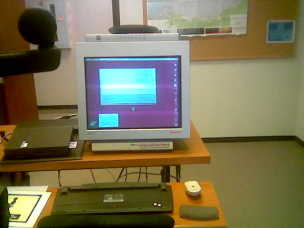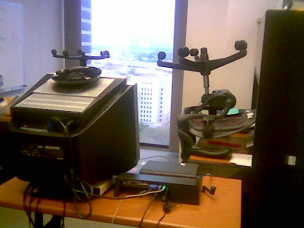The water's playful blue hue belied the purpose of my visit. Normally those light ripples and slow current would welcome my sweating body into its expanse, but from 120 feet above the surface and with seemingly shark-sized barracuda circling for lunch below, there was going to be no frolicking in dewy sea spray for me.
Instead, this trip had a singular purpose: to acquaint me to a tension leg platform (TLP) and do a little hands-on exploring to bring some knowledge and ideas back to the office for some projects I'm working on. For my friends not in the oil industry, a TLP is considered a boat by Coast Guard rules -- it is essentially a floating platform that pulls a mix of oil and gas out of deep wells (I was in around 1700 feet of water I think), processes the mix, and sends the separated oil and gas to shore via miles and miles of pipelines. It. Was. Awesome.
I wanted to laugh at myself and my dorkiness, because one of my first thoughts when disembarking from the helicopter and descending the sturdy metal stairs to one of the many levels of machinery, whirs, and humming, was, "Wow. I'm so glad I happened into mechanical engineering in college. This is sooooooo cool."
I think I would have squealed if my better judgement hadn't told me it'd be inappropriate and possibly delete all of my professional validity with the burly, 200 lb + men that inhabitat the platform for 14 days at a time.
The little pieces of information I've slooowly picked up in the past 3 weeks finally CLICKED in a great way yesterday and today; my vocabulary is becoming such that I can have a full conversation with someone that actually means something technical and productive, without using phrases like, "that thing he referred to when he mentioned the thing with the pressure and the valve? That thing? Know which one I'm talking about?" Luckily the people I work with are really good at what they do, so up to now they've been able to decipher my idiot-speak. But now, I really think I might be able to explain to someone what it is that I do, and, even better, how hydrocarbon production in the Gulf actually works. Well, basically, anyway. And I might still have to throw in a few, "You know, that pressure and valve thingie with the pipe?"
I'm already itching to go back offshore, where the work I do takes on a pertinance and importance that's lost in an office miles from the production. Granted, it was a little strange being one of two, yes TWO, women on a platform with 120 people on board at the time, but no one treated me any differently, and I'm starting to get used to being a rarity.
Nighttime was lonely; everyone gets 15 minutes a day to make personal calls and it's sad when you don't know who to use your 15 minutes to call. Sure, I've got friends but it seems less important to call to shoot the shit for 15 minutes with an old friend when you know everyone else is saving their 15 minutes for a wife or child. Even so, I'd be willing to suffer the sadness of the lonely times for the mental stimulation and excitement of the day's work, not to mention the beauty of the surroundings. Every once in a while, I found myself staring through the metal grates below my feet into the mesmerizing, too-pretty-for-Crayola-to-capture-and-name blue of the ocean. I couldn't get over the fact that, here I was. In the middle of the ocean. Doing engineering stuff. In the Ocean. The smile that escaped my lips forced me to laugh at myself and the speed with which I felt at home. I saw bilges and thought of the time I helped my dad pump the bilge on Physalia (the sailboat I lived on). I saw the sun, and thought of how many times I had ridden against the rails at the very front of the bow as Physalia slowly sliced through the Atlantic's waters, me leaning into the future over those rails, urging the boat to go quicker, quicker over the dark blue to catch my happy heart that was leaping in front of us, 10 knots faster than the sails could carry our fiberglass hull.





